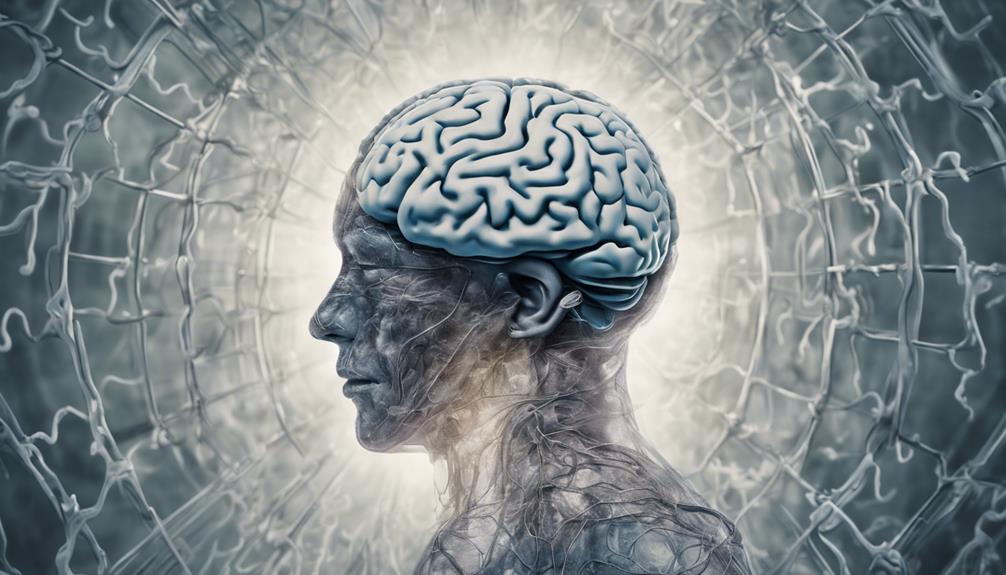Before, it was considered unlikely that dementia could be reversible, but recent advancements have brought attention to the possibility.
Exploring the complexities of the human brain, we have discovered that some forms of cognitive decline can actually be turned around with the right interventions.
Understanding the potential for improvement in cognitive function opens up a realm of possibilities for those affected by dementia.
In the following discussion, we will delve into the various causes, symptoms, diagnostic methods, treatment options, and prevention strategies related to reversible dementia, offering insights that could change the way we approach this condition.
Key Takeaways
- Reversible dementia linked to alcohol, depression, metabolic issues, and deficiencies.
- Early diagnostic tests crucial due to high percentage of reversible cases.
- Treatment includes tailored therapies like thyroid replacement and antidepressants.
- Prevention involves healthy diet, exercise, social engagement, and brain health maintenance.
Causes of Reversible Dementia
Reversible dementia can be attributed to various factors, including potentially reversible causes such as alcohol-related dementia, depression-induced cognitive impairment, and metabolic conditions. Structural brain imaging plays a crucial role in identifying reversible symptoms, especially in cases like normal pressure hydrocephalus.
Additionally, deficiencies like vitamin B-12 and metabolic disorders such as hypothyroidism can manifest as cognitive impairments that are reversible with appropriate interventions.
Depression, a common mental health condition, can also lead to cognitive decline that's reversible when adequately treated. It's imperative to consider these potentially reversible causes when evaluating individuals presenting with dementia symptoms.
Understanding the underlying etiology through comprehensive assessments is key to providing targeted treatment and improving cognitive outcomes for affected individuals. By recognizing and addressing these reversible causes promptly, healthcare providers can offer better management strategies tailored to each patient's specific needs, potentially enhancing their overall cognitive function.
Symptoms of Reversible Dementia

Memory loss, confusion, and difficulty with daily tasks are common symptoms associated with reversible dementia. In addition to these cognitive impairments, behavioral changes like agitation, personality changes, and withdrawal can also indicate reversible dementia. Symptoms of reversible dementia can vary depending on the underlying cause, which could include conditions such as depression, medication side effects, or metabolic disorders. It is crucial to recognize that potentially reversible dementias may manifest with sudden onset cognitive decline, emphasizing the importance of considering reversible causes in diagnosis. Early identification of symptoms is key as it enables healthcare providers to implement appropriate interventions that may lead to an improvement in cognitive function.
| Symptom | Description | Associated Conditions |
|---|---|---|
| Memory loss | Difficulty remembering recent events or information | Depression, Metabolic disorders |
| Confusion | Disorientation, inability to focus or make decisions | Medication side effects, Thyroid disorders |
| Difficulty with daily tasks | Struggling with routine activities like cooking or managing finances | Vitamin deficiencies, Infections |
Diagnosis of Reversible Dementia
Laboratory tests and brain imaging play a crucial role in identifying potential reversible causes of cognitive symptoms in individuals presenting with suspected dementia. Early diagnostic evaluation is key as reversible dementias, such as those stemming from depression, drug effects, metabolic disorders, or infections, may not fully reverse even with treatment. These potentially reversible causes can be uncovered through comprehensive assessments.
It's vital to recognize that reversible dementias can make up a significant portion of cases, up to 23%, underscoring the importance of thorough evaluation in patients exhibiting cognitive decline. Identifying and addressing these reversible causes not only impacts treatment but also informs end-of-life planning and financial arrangements.
Therefore, timely laboratory tests and brain imaging are essential tools in the diagnostic process, allowing for tailored interventions that can improve outcomes and quality of life for individuals facing reversible dementia.
Treatment Options for Reversible Dementia

Addressing underlying causes such as hypothyroidism, depression, and vitamin deficiencies forms the cornerstone of treatment options for reversible dementia. In cases of reversible dementia, early intervention and targeted treatments are crucial for improving cognitive function and enhancing the quality of life for individuals affected. Here are four key treatment options:
- Thyroid Replacement Therapy: Reversing reversible dementia may require the administration of thyroid replacement therapy for hypothyroidism, a condition that can contribute to cognitive symptoms.
- Antidepressants: Managing depression through the use of antidepressants can help alleviate cognitive impairment and improve overall brain function.
- Discontinuing Medications: Identifying and discontinuing medications that contribute to cognitive impairment is essential in the treatment of reversible dementia.
- Lifestyle Modifications: Implementing lifestyle changes such as improving nutrition and addressing sleep disorders can play a significant role in reversing dementia symptoms.
These treatment options, when tailored to the individual's specific needs, can effectively target the underlying causes of reversible dementia and aid in the restoration of cognitive abilities.
Prevention Strategies for Reversible Dementia
In considering the holistic approach to managing reversible dementia, it's imperative to highlight the pivotal role of nutrition, physical activity, and social engagement as key preventive strategies.
A healthy diet rich in fruits, vegetables, whole grains, and lean proteins can reduce the risk of cardiovascular disease and diabetes, both of which are linked to dementia.
Regular physical activity is vital in slowing cognitive decline and lowering the risk of developing dementia.
Additionally, increased social contact and engagement can play a significant role in decreasing the progression of cognitive decline. Strengthening social bonds and maintaining a healthy mood can support neuron health and overall brain function, thereby reducing the risk of dementia.
Frequently Asked Questions
Can Dementia Be Reversed if Caught Early?
If caught early, dementia can show improvement or stabilization through proper interventions.
Early detection and timely treatment are crucial in managing reversible causes like hypothyroidism, depression, or medication side effects.
These interventions can lead to partial or full cognitive restoration.
Can Dementia Be Treated if Caught Early?
If caught early, dementia can be treated effectively through a combination of interventions. Early diagnosis allows for timely initiation of therapies that may help manage symptoms and potentially slow disease progression.
Multifaceted approaches including medication management, lifestyle modifications, and cognitive therapies can play a crucial role in improving quality of life for individuals with dementia.
It's essential to address dementia comprehensively to maximize treatment outcomes and enhance overall well-being.
How Quickly Does Frontotemporal Dementia Progress?
Frontotemporal dementia progresses at varying rates, typically showing noticeable symptoms in one's 50s or 60s. It leads to significant changes in behavior, personality, and language abilities.
Early manifestations include apathy, disinhibition, and language difficulties like speech impairments.
Later stages may involve motor symptoms resembling Parkinson's disease. This progression complexity can impact daily functioning.
Can You Reverse Cognitive Decline?
Yes, we can reverse cognitive decline through early identification and targeted interventions. Addressing underlying causes like depression or medication effects can lead to symptom improvement.
By providing comprehensive evaluations and specific treatments, we can enhance cognitive function and overall well-being.
While not every case guarantees full reversal, managing reversible factors effectively can significantly impact cognitive health and quality of life for individuals experiencing cognitive decline.
Conclusion
In conclusion, the concept of reversible dementia sheds light on the potential for cognitive decline to be partially or fully reversed with appropriate interventions.
By addressing underlying causes such as depression, drug effects, or metabolic disorders, individuals experiencing symptoms of dementia can potentially improve their cognitive function and quality of life.
Early diagnosis and treatment are key in managing reversible dementia, highlighting the importance of recognizing and addressing reversible factors in dementia care.








